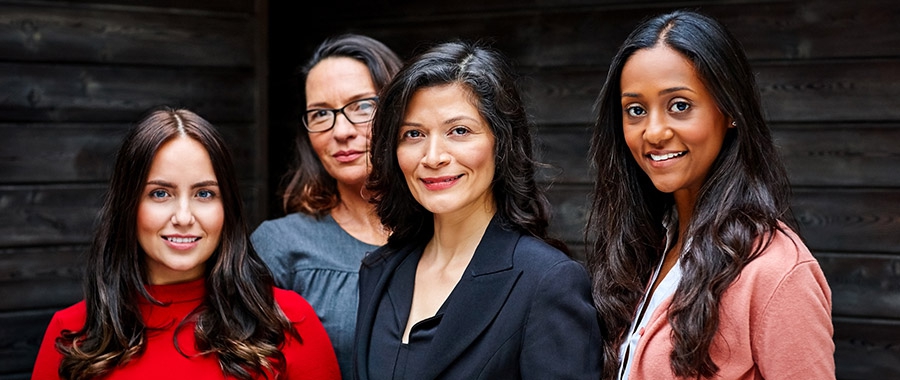The views expressed in our content reflect individual perspectives and do not represent the authoritative views of the Baha'i Faith.
We receive messages—every day—about how we are expected to inhibit our bodies. We are told what we should wear, how to carry ourselves, and even how much space we should take up. These messages often fail to consider the spiritual implications of having a body. The Baha’i writings explain that the human body is a material vessel for our soul—a spiritual entity which has no gender or worldly attributes:
The teachings of Bahá’u’lláh also proclaim equality between man and woman, for He has declared that all are the servants of God and endowed with capacity for the attainment of virtues and bestowals. All are the manifestations of the mercy of the Lord. In the creation of God no distinction obtains. All are His servants. In the estimation of God there is no gender. – Abdu’l-Baha, The Promulgation of Universal Peace, p.374.
As human beings, we are endowed with an identity that is both physical and spiritual, and these two facets of our nature are often in conversation with each other. To demonstrate the spiritual truth that men and women are equal, the Baha’i teachings compare each gender, metaphorically, to the wings of a bird: it is impossible for a bird to fly with two left wings, or when one wing is stronger than the other. When both wings work together and balance each other out, the bird can soar freely, unfettered by inequality.
The world of humanity has two wings—one is women and the other men. … Should one wing remain weak, flight is impossible. – Abdu’l-Baha, Selections from the Writings of Abdu’l-Baha, p. 417.
This metaphor clearly addresses the relative position of women and men in society—and yet we can also extend it beyond literal men and women and use it to explore our concepts of masculinity and femininity. The current constructs of gender are, to say the least, not serving us very well. For example, Western gender norms rigidly presume someone is either masculine or feminine, the right wing or the left wing, one or the other.
There appears to be an underlying assumption here that a person’s gender is informed by nothing more than their anatomy. This immediately presents a problem, because regardless of how people appear, physically and externally, there are a myriad of ways humans can present. Intersex people have existed forever, and they’re not going anywhere. Instead of trying to place people into a strict binary, we can embrace what both masculinity and femininity have to offer:
The world in the past has been ruled by force, and man has dominated over woman by reason of his more forceful and aggressive qualities both of body and mind. But the balance is already shifting; force is losing its dominance, and mental alertness, intuition, and the spiritual qualities of love and service, in which woman is strong, are gaining ascendancy. Hence the new age will be an age less masculine and more permeated with the feminine ideals, or, to speak more exactly, will be an age in which the masculine and feminine elements of civilization will be more evenly balanced. – Abdu’l-Baha, quoted in A Compilation on Women.
While the pendulum of masculinity and femininity has been skewed towards the masculine, the Baha’i teachings indicate this will change. However, this is not to disregard the contributions of people in the past who have embodied and advocated for femininity. The spiritual truth that all are equal is eternal. We can study nontraditional forms of historicizing—such as imagery and oral storytelling—to see many contributions to gender equality that have been overlooked by common historical narratives. This can then inform how we strive to create more balance today.
Qualities associated with femininity—such as being nurturing, empathetic and emotional—are often devalued in society today. The positions that require those qualities are reserved for the arena of low-paying jobs, such as teaching or social work. Our current pay scale rarely takes into account emotional labor—work that typically falls on the shoulders of women, and even more so women of color. A future that values femininity would acknowledge that being empathetic and emotional is equally as powerful as being logical and methodical. We can benefit from seeing the strength in being assertive, as well as knowing when to step back and take up less space.
One step that anyone can take towards a future that encourages femininity is self-reflection. In a culture that has historically elevated people who embody masculinity, we must actively reflect if we are to break that cycle and recognize how deeply rooted the power imbalance is. Fostering a healthy dynamic between these two qualities looks different for everyone. In the context of intentionally creating a more just society, I think it is important for each of us to ponder what traits we embody as individuals and how the environments we find ourselves in contribute to our personal values.
While we engage as individuals in this self-reflection on what we value in ourselves and in others, each institution can also examine itself and strive to take on both masculine and feminine qualities. While ensuring that its demographics are evenly balanced, each institution can move past this to ensure a balance of masculine and feminine qualities. For example, structures like maternity and paternity leave, when offered to employees, are often not taken in full, or even at all. This is often due to the pressure to further one’s career in order to earn more money and sufficiently provide for one’s family. In this way, capitalism plays a huge role in the inequities that exist, especially when it intersects with a patriarchal society. The result can be insufficient feminine qualities in individuals and institutional decisions and policies.
Even something as seemingly neutral as the expected hours of a workday can either acknowledge or disregard the feminine quality of empathy. When parents are expected to work from nine to five each day, their interactions with their children quickly become reduced to routines like waking up, going to school, eating dinner, and getting ready for bed. However, if people are allowed to get off work in time to have quality interactions with their families, or if they are provided with childcare through their workplace, they will become more connected with their families—which benefits everyone. This shifts the emphasis from one of productivity alone to one that also honors and engenders work-life balance.
Change is happening everywhere to create a world that equally values what everyone can bring to the table. From the medical industry to the art world, we see people taking a step back so that the voices of others can finally be heard. Space is slowly being made for femininity to influence spheres of power that have long been ruled by masculinity.
What excites me most about all this change is the fact that anyone can be a part of it. Anyone can converse with peers to more deeply understand the perspectives of others. Anyone can evaluate their own notions of gender and determine whether these notions enhance or inhibit the ability to contribute to the betterment of society. The future is being molded by every action we take.
















Comments
Sign in or create an account
Continue with Googleor